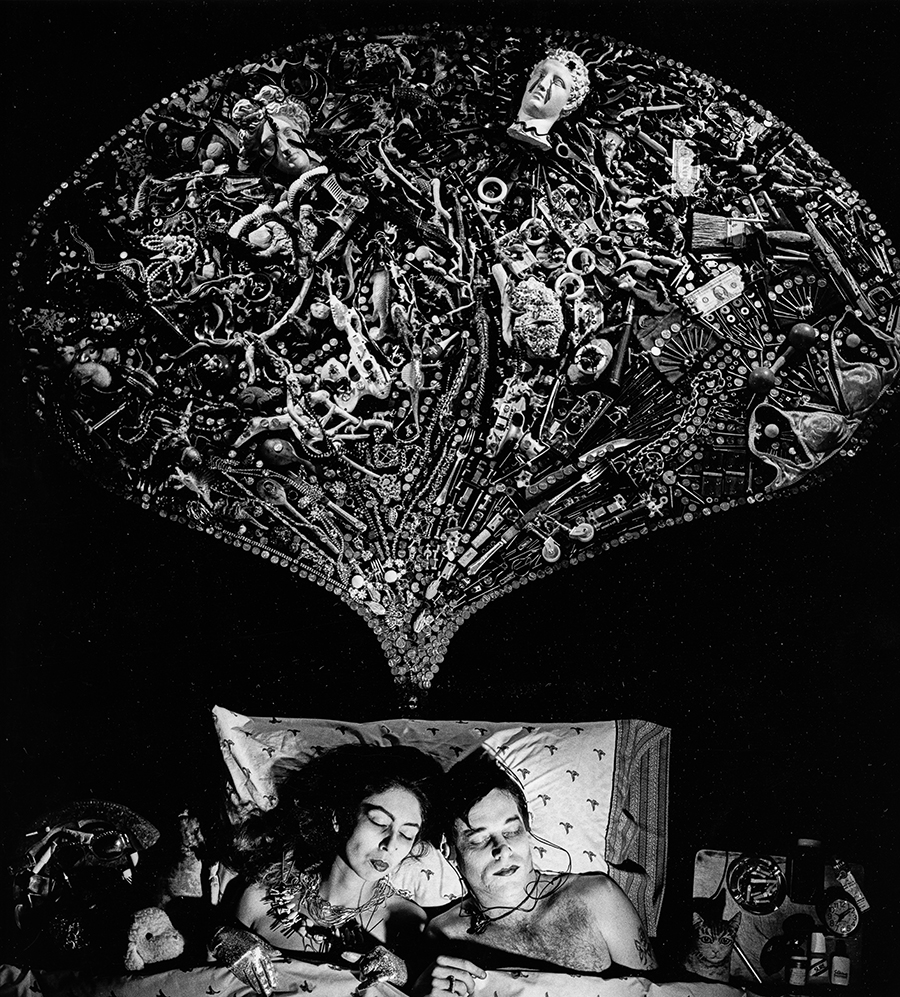The queer polymath who pioneered ’60s counterculture
- Text by Miss Rosen
- Photography by Steven Arnold Museum and Archives, courtesy of Fahey/Klein Gallery

A singular force in the American underground, Steven F. Arnold (1943-1994) transformed the landscapes of film, photography, set and costume design with a visionary approach to his craft.
Now, a new documentary film, Steven Arnold: Heavenly Bodies, honours the legacy of his many guises: integral figure in San Francisco’s psychedelic revolution during the 1960s, Salvador Dalí protégé in the ’70s, and a genderqueer icon during the AIDS crisis of the 1980s.
Hailing from Oakland, Calfornia, Arnold came of age just as the seeds of revolution were taking root. He met Pandora, lifelong friend and muse, in high school. Setting up camp in his bedroom, the pair would play dress-up while drinking champagne and cough syrup, smoking opium and marijuana, all while creating a hippie style that they took to the streets long before it was considered chic.
Arnold began his career creating psychedelic rock handbills for the Matrix nightclub, the Castro District’s Bead Shop, and In Gear, the Haight-Ashbury’s first vintage clothing boutique. Following that, he made his jump into filmmaking during the Summer of Love, simultaneously pursuing his Master’s degree in photography at the San Francisco Art Institute. “San Francisco in the ’60s had a huge impact on Steven and his entire life ethos,” says Vishnu Dass, director of Heavenly Bodies and director of the Steven Arnold Archive.

‘Wreaking with inclinations’, circa 1985
After his film Messages, Messages was screened at the Cannes’ Directors’ Fortnight, Arnold decided to arrange a viewing in his hometown that also featured early surrealist films by Man Ray, Melies, as well as old French animations. The owners of the Palace Theatre were so impressed by the evening’s success that they him to return: in March 1968, he inaugurated Arnold’s Nocturnal Dreamshows, the very first midnight movie showcase in the country, which would go on to inspire a tradition typified by The Rocky Horror Picture Show.
Arnold’s work soon came the attention of Salvador Dalí. “Dalí was enchanted by Steven’s beauty, youth, and creativity,” Dass says. “Dalí expressed his genius through every aspect of his life from his clothing and carefully chosen entourage to the way he decorated his home and crafted his art. This idea influenced Steven deeply, and set the stage for how he would live his life.”

‘Brother Arc’, circa 1985
Arnold’s final act began in Los Angeles in the early 1980s, at the dawn of the AIDS epidemic that would eventually claim his life. Here, he created majestic tableaux photographs that brought together all of his talents in a single work, often crafted from refuse that he alchemically transformed into visual gold. “Rather than focus on the impending doom of the loss of a generation, Steven created images of male angels ascending into the cosmos,” Dass says.
“I call Steven a ‘Queer Mystic’, not only because of his ideas of a non-binary fusion of gender in consciousness, but also due to his deep desire to bring those parts of human expression and sexuality that have been shamed or closeted into the larger spiritual dialogue. He unabashedly chose love and recognised the divinity in everything.”

‘Black Jesus’, circa 1985

‘Intercourse Of Dreams’, circa 1985

‘Center of the Universe’, circa 1985

‘Tranmitigating Inspiration’, circa 1985

‘Sea of Transition’, circa 1985

‘Sovereign Right of Self Discovery’, circa 1985

‘Galactic Adam and Eve’, circa 1985
Steven Arnold: Heavenly Bodies will be screened at Outfest at MOCA Grand in Los Angeles on July 21, 2019. Vishnu Dass will be in conversation with David Fahey, Stephen Jerrome, and Anne Crawford at Fahey/Klein Gallery in Los Angeles on July 20, 2019.
Follow Miss Rosen on Twitter.
Enjoyed this article? Like Huck on Facebook or follow us on Twitter.
Latest on Huck

“My homeland Is everywhere”: Samantha Box is redefining contemporary photography
Confluences — Finding the boundaries of documentary photography too limiting, the US-based photographer has developed a style entirely her own as a canvas to explore her overlapping identities.
Written by: Miss Rosen

In the ’60s and ’70s, Greenwich Village was the musical heart of New York
Talkin’ Greenwich Village — Author David Browne’s new book takes readers into the neighbourhood’s creative heyday, where a generation of artists and poets including Bob Dylan, Billie Holliday and Dave Van Ronk cut their teeth.
Written by: Cyna Mirzai

How Labour Activism changed the landscape of post-war USA
American Job — A new exhibition revisits over 70 years of working class solidarity and struggle, its radical legacy, and the central role of photography throughout.
Written by: Miss Rosen

Analogue Appreciation: Emma-Jean Thackray
Weirdo — In an ever more digital, online world, we ask our favourite artists about their most cherished pieces of physical culture. Today, multi-instrumentalist and Brownswood affiliate Emma-Jean Thackray.
Written by: Emma-Jean Thackray

Meet the shop cats of Hong Kong’s Sheung Wan district
Feline good — Traditionally adopted to keep away rats from expensive produce, the feline guardians have become part of the central neighbourhood’s fabric. Erica’s online series captures the local celebrities.
Written by: Isaac Muk

How trans rights activism and sex workers’ solidarity emerged in the ’70s and ’80s
Shoulder to Shoulder — In this extract from writer Jake Hall’s new book, which deep dives into the history of queer activism and coalition, they explore how anti-TERF and anti-SWERF campaigning developed from the same cloth.
Written by: Jake Hall